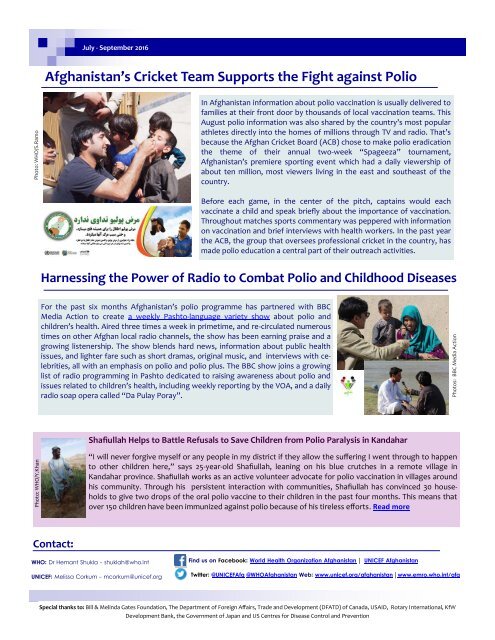WHO/S.Ramo
2eJ5Ly9
2eJ5Ly9
Create successful ePaper yourself
Turn your PDF publications into a flip-book with our unique Google optimized e-Paper software.
July - September 2016<br />
Afghanistan’s Cricket Team Supports the Fight against Polio<br />
Photo: <strong>WHO</strong>/S.<strong>Ramo</strong><br />
In Afghanistan information about polio vaccination is usually delivered to<br />
families at their front door by thousands of local vaccination teams. This<br />
August polio information was also shared by the country’s most popular<br />
athletes directly into the homes of millions through TV and radio. That’s<br />
because the Afghan Cricket Board (ACB) chose to make polio eradication<br />
the theme of their annual two-week “Spageeza” tournament,<br />
Afghanistan’s premiere sporting event which had a daily viewership of<br />
about ten million, most viewers living in the east and southeast of the<br />
country.<br />
Before each game, in the center of the pitch, captains would each<br />
vaccinate a child and speak briefly about the importance of vaccination.<br />
Throughout matches sports commentary was peppered with information<br />
on vaccination and brief interviews with health workers. In the past year<br />
the ACB, the group that oversees professional cricket in the country, has<br />
made polio education a central part of their outreach activities.<br />
Harnessing the Power of Radio to Combat Polio and Childhood Diseases<br />
For the past six months Afghanistan’s polio programme has partnered with BBC<br />
Media Action to create a weekly Pashto-language variety show about polio and<br />
children’s health. Aired three times a week in primetime, and re-circulated numerous<br />
times on other Afghan local radio channels, the show has been earning praise and a<br />
growing listenership. The show blends hard news, information about public health<br />
issues, and lighter fare such as short dramas, original music, and interviews with celebrities,<br />
all with an emphasis on polio and polio plus. The BBC show joins a growing<br />
list of radio programming in Pashto dedicated to raising awareness about polio and<br />
issues related to children’s health, including weekly reporting by the VOA, and a daily<br />
radio soap opera called “Da Pulay Poray”.<br />
Photos: BBC Media Action<br />
Shafiullah Helps to Battle Refusals to Save Children from Polio Paralysis in Kandahar<br />
Photo: <strong>WHO</strong>/Y.Khan<br />
“I will never forgive myself or any people in my district if they allow the suffering I went through to happen<br />
to other children here,” says 25-year-old Shafiullah, leaning on his blue crutches in a remote village in<br />
Kandahar province. Shafiullah works as an active volunteer advocate for polio vaccination in villages around<br />
his community. Through his persistent interaction with communities, Shafiullah has convinced 30 households<br />
to give two drops of the oral polio vaccine to their children in the past four months. This means that<br />
over 150 children have been immunized against polio because of his tireless efforts. Read more<br />
Contact:<br />
<strong>WHO</strong>: Dr Hemant Shukla - shuklah@who.int<br />
UNICEF: Melissa Corkum - mcorkum@unicef.org<br />
Find us on Facebook: World Health Organization Afghanistan | UNICEF Afghanistan<br />
Twitter: @UNICEFAfg @<strong>WHO</strong>Afghanistan Web: www.unicef.org/afghanistan | www.emro.who.int/afg<br />
Page 4<br />
Special thanks to: Bill & Melinda Gates Foundation, The Department of Foreign Affairs, Trade and Development (DFATD) of Canada, USAID, Rotary International, KfW<br />
Development Bank, the Government of Japan and US Centres for Disease Control and Prevention


